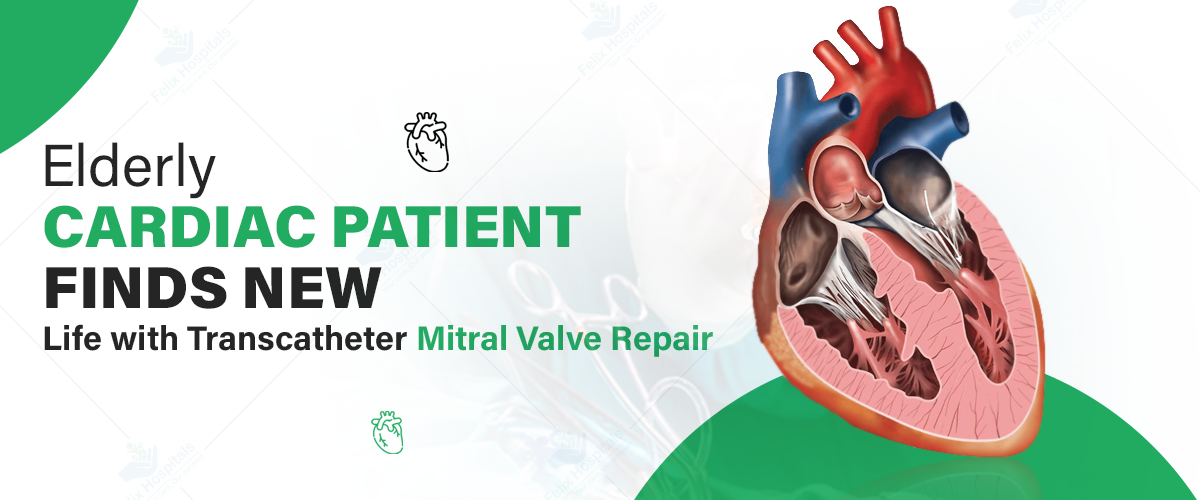
Subscribe to our

Mitral valve disease is a debilitating condition that affects the heart’s ability to regulate blood flow efficiently between the left atrium and the left ventricle. In elderly patients, this condition can lead to severe complications, such as heart failure, reduced mobility, and a diminished quality of life. Traditional open-heart surgeries, while effective, often pose significant risks for older individuals due to their frailty and co-existing medical conditions.
Enter Transcatheter Mitral Valve Repair (TMVR), a revolutionary procedure offering a safer alternative for high-risk patients. This minimally invasive technique has transformed cardiac care, providing effective treatment with fewer complications. For patients seeking such advanced care, the best cardiology hospital in Noida stands out for its expertise and cutting-edge facilities.
If you or a loved one is struggling with mitral valve disease, don't wait any longer. Contact us today at +91 9667064100.
The mitral valve is a crucial part of the heart that ensures unidirectional blood flow from the left atrium to the left ventricle. When this valve is damaged or becomes dysfunctional, it can lead to conditions like mitral regurgitation, where blood flows backward into the atrium, placing additional strain on the heart.
For older adults, mitral valve disease can exacerbate existing health issues, such as hypertension and diabetes. If left untreated, it may lead to heart failure. These symptoms often restrict daily activities, making it challenging for elderly patients to maintain independence.
Open-heart surgery, while effective for treating mitral valve disease, involves longer recovery periods and higher risks for elderly patients. Frailty, co-morbidities, and the need for general anesthesia often make many patients ineligible for these procedures.
TMVR is a minimally invasive procedure designed to repair a malfunctioning mitral valve without the need for open-heart surgery. During TMVR, a catheter is inserted through a vein in the leg and guided to the heart, where specialized tools are used to repair the valve.
This innovative approach has redefined cardiac care, especially for elderly patients, enabling them to regain their quality of life with minimal disruption.
Before the TMVR procedure, patients undergo detailed imaging studies to assess the severity of their condition and plan the intervention. These tests help the medical team identify the most suitable approach for the repair.
The TMVR procedure involves inserting a catheter through a vein in the leg and guiding it to the heart. Using state-of-the-art imaging technology, the cardiologists repair the mitral valve without the need for open surgery. The procedure is completed within a few hours under anesthesia.
TMVR has proven transformative for elderly patients, offering them a second chance at an active and fulfilling life.
Patients often report improved overall health, allowing them to participate in daily activities and enjoy time with loved ones, free from the limitations of their previous condition.
Felix Hospital offers expert care for Transcatheter Mitral Valve Repair (TMVR) through the best cardiologists in Noida at Felix Hospitals:
These specialists are committed to offering the best heart care and optimal outcomes for patients with mitral valve disorders.
Reach out now to book your appointment and learn how this revolutionary treatment can transform your heart health.
The journey of patients undergoing Transcatheter Mitral Valve Repair highlights the procedure's transformative potential. TMVR offers elderly patients struggling with mitral valve disease a pathway to restored health and independence.
The expertise of skilled cardiologists, combined with advanced medical infrastructure, makes the best cardiology hospital in Noida a leader in innovative cardiac care. While the cost of TMVR treatment may vary, the procedure's benefits far outweigh the investment, offering patients renewed hope and vitality.
1-Who is eligible for TMVR?
ANS: TMVR is particularly beneficial for high-risk patients, including the elderly or those with co-existing health conditions who may not be suitable candidates for traditional open-heart surgery. A thorough evaluation by a cardiologist is required to determine eligibility.
2-What are the advantages of TMVR over traditional open-heart surgery?
ANS: TMVR is minimally invasive, meaning it involves smaller incisions, reduced risks of complications, and a faster recovery time compared to traditional open-heart surgery. It’s an ideal option for patients who are not fit for more invasive procedures.
3-How long does the TMVR procedure take?
ANS: The TMVR procedure typically takes a few hours to complete, depending on the complexity of the case. Patients are usually under anesthesia, ensuring they are comfortable throughout the procedure.
4-What is the recovery time after TMVR?
ANS: Most patients experience immediate symptom relief, such as reduced breathlessness and fatigue, and can be discharged within 48 hours. Full recovery generally takes a few weeks, during which patients gradually resume their normal activities.
5-Are there any risks associated with TMVR?
ANS: While TMVR is a minimally invasive procedure with a lower risk profile than traditional surgery, like any medical procedure, it does carry some risks, such as infection, bleeding, or complications with the heart’s rhythm. However, these risks are relatively rare, and the procedure’s benefits typically outweigh them.
6-Will I need follow-up care after TMVR?
ANS: Yes, patients typically need regular follow-up visits to monitor heart health and ensure the mitral valve is functioning correctly. The frequency of follow-up visits will depend on individual recovery and the cardiologist’s recommendations.
7-How does Transcatheter Mitral Valve Repair (TMVR) work?
ANS: TMVR involves inserting a catheter through a vein in the leg, which is guided to the heart. Specialized tools are used to repair the mitral valve without the need for open-heart surgery. The procedure is minimally invasive, offering quicker recovery and fewer risks.